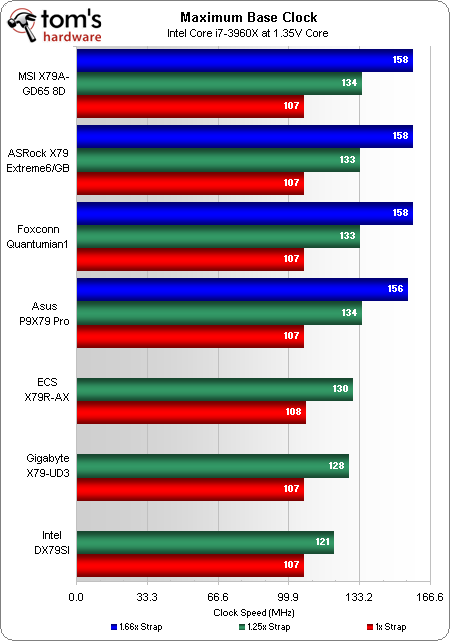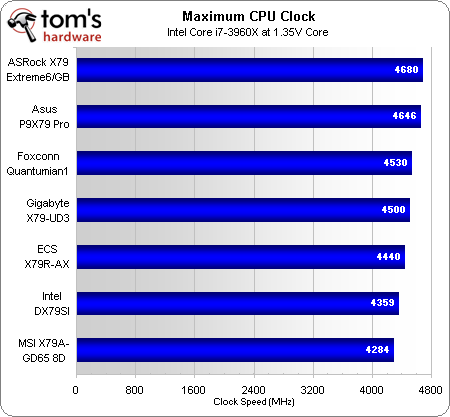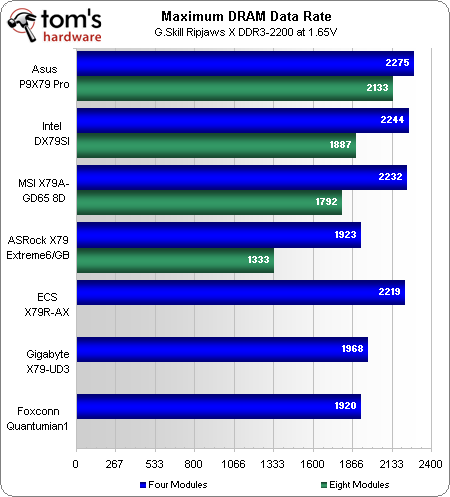Seven $260-$320 X79 Express Motherboards, Reviewed
With 40 lanes of PCIe 3.0 connectivity to host all of our high-bandwidth devices, LGA 2011 certainly qualifies as a premium processor interface. Today we examine seven X79-based motherboards that offer high-end features at a more palatable price.
Get Tom's Hardware's best news and in-depth reviews, straight to your inbox.
You are now subscribed
Your newsletter sign-up was successful
Overclocking
| BIOS Frequency and Voltage settings (for overclocking) | ||||
|---|---|---|---|---|
| Row 0 - Cell 0 | ASRock X79 Extreme9 | Asus P9X79 Pro | ECS X79R-AX | Foxconn Quantumian-1 |
| Base Clock | 90-300 MHz (1 MHz) | 80-300 MHz (0.1 MHz) | 50-250 MHz (1 MHz) | 100-125 MHz (0.1 MHz) |
| CPU Multiplier | 12x to 60x (1x) | 12x to 57x (1x) | 12x to 65x (1x) | Unlimited |
| DRAM Data Rates | 800-2400 (266.6 MHz) | 800-2666 (266.6 MHz) | 1066-2400 (266.6 MHz) | 1066-2400 (266.6 MHz) |
| CPU Vcore | 0.60-1.70 V (5 mV) | 0.80-1.70 V (5 mV) | -0.30 to +0.70 V (10 mV) | +0.10 to +0.63V (10 mV) |
| CPU VCCA | 0.60-1.70 V (5 mV) | 0.80-1.70 V (5 mV) | -0.30 to +0.60 V (10 mV) | +0.10 to +0.63V (10 mV) |
| VTT Voltage | 0.95-1.49 V (7 mV) | 1.05-1.70 V (6.25 mV) | -0.20 to +0.50 V (10 mV) | 1.01-2.01 V (12.5 mV) |
| X79 PCH Voltage | 0.73-1.91 V (13 mV) | 1.10-1.70 V (6.25 mV) | -0.20 to +0.30 V (10 mV) | 1.01-2.01 V (12.5 mV) |
| DRAM Voltage | 1.20-1.80 V (15 mV) | 1.20-1.99 V (5 mV) | -0.30 to +0.50 V (10 mV) | 1.01-2.30 V (12.5 mV) |
| CAS Latency | 4-15 Cycles | 3-15 Cycles | 3-15 Cycles | 3-15 Cycles |
| tRCD | 4-15 Cycles | 4-15 Cycles | 3-15 Cycles | 3-15 Cycles |
| tRP | 4-15 Cycles | 4-15 Cycles | 3-15 Cycles | 3-15 Cycles |
| tRAS | 9-63 Cycles | 4-40 Cycles | 9-63 Cycles | 9-63 Cycles |
| BIOS Frequency and Voltage settings (for overclocking) | |||
|---|---|---|---|
| Row 0 - Cell 0 | Gigabyte X79-UD3 | Intel DX79SI | MSI X79A-GD65 8D |
| Base Clock | 80-133 MHz (0.01 MHz) | 90-147 MHz (225 kHz) | 90-200 MHz (1 MHz) |
| CPU Multiplier | 12x to 59x (1x) | 5x to 65x (1x) | 12x to 60x (1x) |
| DRAM Data Rates | 800-3200 (266.6 MHz) | 800-2400 (266.6 MHz) | 800-2400 (266.6 MHz) |
| CPU Vcore | 0.80-1.74V (5 mV) | 1.00-1.92 V (5 mV) | 0.80-1.80 V (5 mV) |
| CPU VCCA | 0.83-1.96 V (10 mV) | 0.85-1.80 V (5 mV) | 0.85-1.80 V (5 mV) |
| VTT Voltage | 0.72-2.08 V (5 mV) | 1.05-1.80 V (12.5 mV) | 0.85-1.69 V (10 mV) |
| X79 PCH Voltage | 0.83-1.51 V (5 mV) | 1.10-1.50 V (12.5 mV) | 0.90-1.90 V (10 mV) |
| DRAM Voltage | 1.10-2.10 V (5 mV) | 1.20-1.93 V (12.5 mV) | 1.05-2.45 V (15 mV) |
| CAS Latency | 5-15 Cycles | 5-16 Cycles | 5-15 Cycles |
| tRCD | 5-31 Cycles | 5-16 Cycles | 4-15 Cycles |
| tRP | 5-15 Cycles | 5-16 Cycles | 4-15 Cycles |
| tRAS | 5-63 Cycles | 15-75 Cycles | 10-40 Cycles |
While chipset limitations make made super-high mainstream LGA 1155 base clocks impossible to achieve, the X79 platform’s base clock ratios also make them unnecessary. For example, Foxconn’s low-looking 125 MHz base clock limit can be multiplied by 1.67 before it gets to the CPU, and the 208 MHz result yields a CPU clock more than 100% above stock.
That’s not to say that any specific combination of hardware can be pushed more than 100% beyond stock. Even by dropping our CPU multiplier, we were unable to push any of these platforms beyond 158 MHz. With the 1.66x strap employed, that should be an underclock for the X79 PCH.
Asus might be the only company with a workaround for our processor’s multiplier issue, but that didn’t make its P9X79 Pro the top overclocker in today’s competition. That honor goes to ASRock, using 36 x 130 MHz in conjunction with a 1.25x strap.
Asus continues to lead in memory overclocking, which is why this editor so often chooses its products for our memory round-ups. That’s not to say memory overclocking packs a particularly noticeable performance punch, but we do like to know the limits of our hardware.
Current page: Overclocking
Prev Page Power, Heat, And Efficiency Next Page Which X79-Based Motherboard Is Right For You?Get Tom's Hardware's best news and in-depth reviews, straight to your inbox.
-
Crashman jprahmanSo when will we see results with a C2?It's going to take around a month to prepare another roundup...so I guess good news comes with bad news, sorry.Reply -
Crashman amuffinfoxconn boards are pretty good.They've been making decent enthusiast boards on-and-off for a while.Reply -
morne Quick coment on looks only (I know its specs that count not looks but oh well)Reply
ASRock X79 Extreme6/GB - very nice all black looks better than gigabytes atempt
Asus P9X79 Pro - new baby blue they use on all the boards... not for me
ECS X79R-AX - looks like my old pentium 2 board with the white slots
Foxconn Quantumian-1 - i like i like gives a feeling of the ROG ASUS boards
Gigabyte X79-UD3 - rip of from the ASRock X79 Extreme6/GB (lol) plus the southbridge heatsink looks old fasion and ugly.
Intel DX79SI - now this board for me looks good actualy more than good looks the best :) must be the scull lol
MSI X79A-GD65 8D - also very nice love the blue + Black.
If you have one of the boards and i insulted it, wasnt the intention, just my view of the board>
-
stingstang My only question is.. Why do you guys need 6 freaking $1050 processors? Good golly gosh!Reply -
ubercake Great descriptive article.Reply
One thing I'm not sure of is the acceptance and actual usage of eSATA. While practical at some level, is anyone actually using this MB feature or is this one of those things the MB producers can skip out on like parallel and serial ports? I'm not sure enthusiasts are all that into using their eSATA ports?
Personally, I think this is one of those money saving opportunities MB producers should consider. -
geekapproved After the X58 anal pounding, you would be a moron to buy a X79. It's life is predicted to be even shorter than X58.Reply -
morne Actualy i agree with you ubercake, i have never used my E-sata, and with usb 3.0 out doubt anyone still uses E-sata if they have before.Reply



